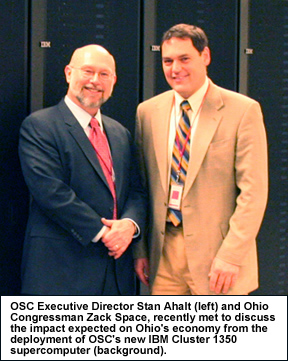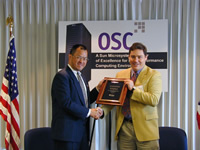Ohio Advances State's Computational Research Success with Third Round of Cluster Ohio Awards
For more information, contact:
Leslie Southern
High Performance Computing Director
(614) 292-9367
leslie@osc.edu
Columbus, OH - February 4, 2004 - The Ohio Supercomputer Center (OSC) has awarded five AMD Athlon clusters to Ohio research teams as part of its Cluster Ohio program. The high performance computing (HPC) clusters provided by OSC enable advanced research capabilities and promote Ohio's national competitiveness in science and technology discovery.

 For the past 14 years, OSC (Ohio Supercomputer Center) has made a place for itself in the world of high performance networking and computing. This year will be no exception when OSC showcases recent projects at Supercomputing 2002 (SC2002), an annual weeklong national supercomputing conference. SC2002 will be held at the Baltimore Convention Center on November 16-22.
For the past 14 years, OSC (Ohio Supercomputer Center) has made a place for itself in the world of high performance networking and computing. This year will be no exception when OSC showcases recent projects at Supercomputing 2002 (SC2002), an annual weeklong national supercomputing conference. SC2002 will be held at the Baltimore Convention Center on November 16-22.